#Indiana Street incident
Explore tagged Tumblr posts
Text
Tragic Accident Claims Pedestrian's Life on 60 Freeway in Boyle Heights
Boyle Heights, CA – A fatal incident occurred this evening on the eastbound 60 Freeway near Indiana Street, where a pedestrian was struck and killed by a vehicle. Authorities are currently investigating the circumstances surrounding the accident.
The identity of the victim has not been released, and it remains unclear why the pedestrian was on the freeway at the time of the collision. The driver involved remained at the scene and is cooperating with law enforcement officials.
This tragic event highlights the dangers pedestrians face when near or on freeway systems. The California Highway Patrol (CHP) advises that pedestrians should avoid freeway areas due to high-speed traffic and limited visibility.
As the investigation continues, authorities urge anyone with information about the incident to contact the CHP's East Los Angeles office.
Attribution: Information sourced from Key News.
Have you been spending all your money and time on making music and shooting videos, but still not getting any exposure? Tired of just spinning your wheels? You know to get exposure you need to get featured on blogs, radio stations, playlist, and get your music e-mail blasted out to the masses. Need help getting all that done? Then check out the Package we’ve made available for you below!
Like & Listen To Our Spotify Playlist
trapLAXradio On The Air Now!
The Latest Music, Videos, News, Entertainment……
#trapLA#Boyle Heights pedestrian accident#60 Freeway fatality#Indiana Street incident#freeway safety#CHP investigation#pedestrian safety#Los Angeles traffic news
0 notes
Text
AU-gust, Day 4: Runaway
My Little Runaway (5+1)
In the aftermath of the “earthquakes” – Wayne doesn’t buy that government bullshit for a second, earthquakes his ass – Hawkins becomes entirely uninhabitable. And said United States government, out of the goodness of its heart, deigns to relocate all of its remaining citizens to one of the nearby towns in Indiana (except for Eddie and his friends that got all mixed up in that bullshit Wayne still doesn’t fully know about; all of them get relocated to Illinois, Wayne included.)
And it's nice, in the immediate aftermath, having all of them around, Jim and Joyce and those kids. They make Eddie come to life in a way that Wayne had worried he’d never see again during those first few days in the hospital. It’s nice having other adults to talk to, who understand the circles under his eyes, who wake up alongside their own kids when they start screaming. Hell, it’s even nice living next to the Harrington’s boy – Steve, who looks just like his father yet couldn’t act more different. Steve, who shepherds around the kids and that girl with the short blonde hair without a complaint.
Steve, who is starting to spend a lot of time in Eddie’s bedroom these days.
So despite the hullaballoo and pain it took to get here, Wayne is grateful that they all live so close, that their houses are all in a row on that sunny suburban block. He’s grateful to have a house, with neighbors that are actually his friends. And he’s grateful that when Steve and Eddie do start dating, when Eddie is all but moved into Steve’s small house next-door, that he’s still close enough to see his kid every day.
(At least, he’s grateful for it at first.)
1. The Lawn Incident
The first time it happens, they aren’t dating yet.
“WAYNE!”
Wayne startles at the sound of Eddie’s shout as he sprints through the front door, screen shutting behind him with a loud bang.
“What? What is it?!”
The government is after them. That kid from Hawkins is there, he’s got a gun. Eddie’s hurt, he’s bleeding, he’s –
“Get me away from him!” Eddie screeches, gesturing at the door he just ran through. Wayne grabs for his rifle (the one he keeps next to the door just in case) and runs forward, expecting to see a mob on his doorstep –
There’s no mob.
There’s no sign of anyone. Just Steve Harrington mowing Claudia Henderson’s lawn across the street, shirtless –
Wayne sets the gun back down by the door and turns to shoot Eddie an unimpressed look.
“What? What?! Didn’t you see that? He’s trying to kill me!” Eddie pants, peering out the window and ducking as Steve turns. He sees Wayne and waves.
“He’s not the one you need to worry about killing you, boy.”
Wayne leaves Eddie to his moaning about the boy’s physique and tan and sweat and heads to the kitchen. (Surely 10 AM isn’t too early for a beer.)
2. The First Date
Wayne’s honestly grateful that the Harrington boy moves faster than his own nephew. If it was up to Eddie, he’d be pining for years. Steve, on the other hand, didn’t hesitate to invite him to dinner the next time he saw Eddie after The Lawn Incident. And he has the insight to plan their dinner date for the following day, meaning Eddie only has twenty-four hours to work himself into a tizzy.
(Granted, that’s plenty of time for Eddie to accomplish that, but still.)
Anyways, Wayne has to sit through Eddie parading across the living room in various band shirts of varying quality before Eddie finally decides on the one he’d tried on first (Iron Maiden, and Wayne doesn’t have the heart to tell him that maybe a grinning skeleton isn’t the best idea for a first date but hey, the Harrington boy already knows what he’s getting into), and Eddie’s debating the merits of sneakers versus boots when the doorbell rings.
Eddie spins around so fast to stare at Wayne that Wayne has to stifle his laughter. “He’s here!”
“You gonna get the door then, or are you just gonna let him decorate the porch?”
“Right, right,” Eddie mutters, first to Wayne and then to himself. Throwing his shoulders back, he takes a deep breath and makes his way to the front door. Wayne watches as Eddie nods to himself once, twice, and pulls the door open –
And then just stands there, blinking at the Harrington boy, before slamming the door in his face.
“Eds? Everything okay?”
Eddie whips around and backs up against the door, pale like he’s seen a ghost. He tries to whisper something to Wayne, but Wayne can’t hear it. “Sorry?”
“I said HE BROUGHT ME FLOWERS!”
“Are you gonna let him in and get a vase or – ”
“Huh? Oh, SHIT - ” Eddie turns back around and throws open the door. The Harrington boy is standing there with an amused grin on his face that only grows wider as Eddie starts babbling, snatches the flowers out of his hand and makes a break for the kitchen, leaving Wayne and the kid to look at each other.
“He’s a little excitable,” Wayne finally breaks the silence, and the Harrington boy laughs.
“I know. I like that about him, though.”
Wayne lets himself finally smile at the Harrington kid – Steve. “Me too, kid. Me too.”
3. The GED
“Wayne, you gotta hide me!”
Wayne barely has time to set his coffee down before Eddie is sliding into the living room and diving behind the couch. “Oh? And what’s the emergency today?”
Eddie pokes his head up from behind the chartreuse couch cushion. “Wheeler’s gone crazy, Wayne! Do you know how many flashcards she has?”
“More than a few, I’d hope. Your test is coming up next month.”
“They’re color-coded,” Eddie hisses. The doorbell rings and he dives back down, making a meep sound.
Wayne rolls his eyes and stands up out of his rocking chair. “I guess I’ll get the door.”
“NO NO NO - ”
He opens the door and Steve is standing there, alongside the older Wheeler girl and Steve’s friend Robin. “Wayne,” the Wheeler girl greets him with a tight smile, and then she’s passing him and powerwalking into the living room, Robin at her heels. (And judging by the immediate hollering Wayne hears, she finds Eddie relatively quickly.)
“Evening,” Wayne greets Steve over the din of voices in his living room. “I take it studying’s going well?”
The sound of something breaking cuts Steve off before he has a chance to reply, and Steve shoots a nervous look at Wayne. “It’s, uh, it’s going. I think Nance might have met her match.”
“Mmm,” Wayne hums, and then something else crashes onto the floor and ya know, Wayne didn’t need to watch Bonanza tonight anyways.
“I heard Hopper got some new IPAs from Wisconsin?” Steve offers, wincing as the sound of Eddie and Wheeler arguing meets its crescendo.
“Let me grab my jacket.”
4. The Fight
Wayne’s not expecting there to be any lights on when he gets home from the shop that day; Eddie had said something about an anniversary dinner with Steve, something about six months of dating, so it’s a shock to walk through the door and see Eddie swaddled under a blanket, eating ice cream while watching The Thing.
“Everything okay, son?”
“Of course! I mean, what would I have to be upset about?” Eddie snaps, forcefully digging his spoon into the Chunky Monkey.
“Right,” Wayne says, and then slowly makes his way into his bedroom where he makes a call.
“Eddie, please, I just want to talk - ”
“Sorry, son, it’s just me.”
A choked-up Steve sighs over the phone. “Hey Wayne.”
“Hey, kid. You mind telling me why Eddie’s on a mission to clean out Ben & Jerry’s tonight?”
Steve sniffles. “I asked him to be my boyfriend. Like, officially.”
“Then what’s the problem?”
“Eddie assumed we already were, which is bullshit because I asked him, like, after our fourth date and he said no, he wasn’t sure if he was ready to be ‘Steve Harrington’s Boyfriend’ or whatever but apparently it was a joke and, I mean, it’s not like I’ve been dating anyone else but I just thought - ”
“That he meant what he said, right,” Wayne huffs out a breath. “Let me go talk to him for a bit, okay son?”
“ ‘kay. Thanks, Wayne,” Steve replies quietly, and then he hangs up the phone. Wayne takes a moment to look at the ceiling – Lord, he loves his kid, but this is not what he wanted to be doing on his Friday – but he heads back into the living room anyways and turns off the TV.
“Hey!”
“Son, we need to talk.”
“About what?”
“About what you said to Steve, that’s what.”
Eddie grumbles, stabbing his spoon through the bottom of the ice cream carton. “You’re on his side then?”
“Hey, you’re my kid. I’m always gonna be on your side. But that means sometimes I gotta tell you when you’re in the wrong and right now, son, you’re in the wrong.”
Eddie throws his head back against the couch with a sigh. “It’s just – he should have known!”
“Eds, we both got a bit of that Munson-meanness in us. We both know that sometimes our jokes don’t sound like jokes. How was your boy supposed to know that if you didn’t talk to him about it after the fact? He can’t read your mind, kid.”
“I know, I know, I fucking know!” Eddie scrunched his face up and threw the empty ice cream carton to the side. “It’s my fucking fault and I just – I hate that he thought I was just trying him out for six fucking months, as if I’d actually do something like that to him!”
“Well,” Wayne sighs, “then it sounds like both of you let your own shit get in the way of things. And the only way you can fix it now is if you talk it out.”
“And say what?”
“That it was a stupid joke and that you’re not the sort of person who’d treat anyone that way. And for the record, kid, I think he knows that. He might be gone on you, but he’s not the type of guy who’d stay with someone who treated him badly.”
Eddie bites at his lip for a little bit. “Okay. I’m gonna go talk to Steve.”
“Good,” Wayne nods, and then Eddie is fast-walking to the door –
And he still has Wayne’s blanket.
“Bring that blanket back!”
“Yes, Wayne.”
“And some more Chunky Monkey!”
“Yes, Wayne!”
(Wayne’ll be lucky if he sees either in the next year.)
5. The Game
It’s a perfect fall Sunday; a cool breeze flows in through the open window, Wayne has a cold beer and a new can of peanuts in front of him, and the Colts are starting as receivers for the first playoff game of the season. He has four blissful hours of peace in front of him, just him, his football team, and –
“WAYNE!”
Wayne groans as Eddie slams into the house. “WAYNE, I need – no, no, no, WHY? You’re watching the game too?!”
“It’s the playoffs, son,” Wayne says. Or, rather, he tries to say; a whole stampede of footsteps follow Eddie into the house and suddenly Wayne’s surrounded by his kid, six teenagers, a pre-teen and the Corroded Coffin boys (who were in town for a visit).
“Whatever, he can watch the game Eddie, we just need a table - ”
“ – grab the extra chairs, we can get it set up - ”
“Wait, wait, wait, set up what exactly?” Wayne asks but the teens have scattered, running to all ends of his house to set up something at his dining room table and – ah, yes. Their dragon game.
“Really, son?” Wayne asks as Eddie walks by and snatches a couch pillow. “Can’t you do this at your house?”
“I promised Steve that he could have the house if his team made the finals or whatever - ”
“The playoffs, Ed.”
“ – yeah, that’s what I said, but we need to finish up this campaign before Jeff and Gareth go back to school and - ”
“Yeah, yeah, yeah.” Wayne scoops his beer and his peanuts up and heads for the door.
“ – only six hours or so and – hey, where are you going?”
“I’m running away,” Wayne replies drily as he shoots Eddie a final wave. “Steve has a bigger TV anyways.”
Eddie lets out a theatrical gasp, but Wayne is too far away to hear whatever else he has to say.
(Steve does have a bigger TV. And Jim and Charles are fans, too. Maybe they have more of that IPA.)
+1 The Proposal
Wayne’s used to it by now, the sound of his front door slamming shut. It usually signals that Eddie’s in one of his moods, or is excited to share something about the store or Steve or their brand new puppy – Strider, because his kid is a nerd – or because it’s been seventy-two hours and at that point Eddie usually feels the need to make an entrance to check in on Wayne because it’s rare these day that they go three days without at least checking in, but when Wayne goes to check the door, it isn’t Eddie standing there.
It's Steve, and he’s panting.
“Steve? You okay, son?”
‘Yeah, yeah,” he nods, “I just – I don’t know how much longer I can put it off.”
Wayne feels warm all the way in the cockles of his heart. “It’s just ‘til this weekend, son.”
“I know! But Eddie’s so smart,” Steve complains, running his fingers through his hair, “he’s so smart and he knows something’s up and I’m trying not to act weird but because I’m trying not to act weird then he knows that I’m acting weird, and I’m afraid he’s going to pull away again and I just – we just keep having moments where I want to tell him and I keep having to stop myself and I don’t know if I can wait any longer – ”
“Then don’t.”
“ – and I – what?”
Wayne shrugs. “If you don’t want to wait any longer, then don’t.”
Steve looks lost. “But I – I just want this to be perfect. Eddie deserves something perfect.”
“Kid, you are his something perfect,” Wayne replies, and Steve flushes bright red. “You could ask him while he’s on the shitter and it’d be perfect because it’s you.”
“You really think so?” Steve asks shyly. “I mean, not that I’m going to ask him when he’s going to the bathroom - ”
“You probably could do a little better than that,” Wayne agrees, and the two men are laughing when Eddie bursts into the room behind them.
“WHAT is going on here, hmm?” Eddie exclaims.
“Eddie,” Wayne starts, trying to stop whatever monologue is coming but Eddie cuts him off.
“No, Wayne, don’t try to tell me something isn’t going on because something is going on and you,” Eddie says, turning to point at a bright-red Steve, “you are being incredibly suspicious right now and if I didn’t know any better, I would say that you keep running every time we’re in the same room because you don’t want to be with me anymore but that can’t possibly be true because I woke up with you - ”
“EDWARD ANTHONY MUNSON,” Wayne interrupts, completely unwilling to hear whatever scandalous thing was going to come out of Eddie’s mouth next, but it turns out he didn’t have to be the one to interrupt Eddie after all because Eddie has stopped talking entirely. He’s just standing in Wayne’s living room and gaping at Steve.
Steve, who is kneeling on Wayne’s shaggy carpet, a black ring box in his hand.
Wayne’s throat tightens up as soon as he sees the tears lining Eddie’s eyes. “Steve?”
“I was going to wait until next weekend,” Steve starts shakily. “I had a whole plan. I was going to take you to Metallica next weekend and wait until they started playing our song - ”
“Nothing Else Matters.”
“ – right, ‘Nothing Else Matters,’” Steve replies, his own eyes swimming but he’s beaming at Eddie, he’s smiling up at Wayne’s son and shit, Wayne’s going to need a handkerchief himself, “and then I was going to slide this ring onto your hand and – I know that we’ve only been together a year, I know it’s really, really fast – ”
Eddie’s half-laughing and half-gasping for breath, tears streaming down his face and collecting in the corners of his smile.
“ – and I know that it’s only for us, really, but being with you – this past year has been the best year of my life and maybe it makes me selfish, but I want the rest of them, too. I want them all with you, Eds. Will you - ” Steve swallows, bracing himself, “would you do me the honor of being my not-at-all-lawfully-wedded husband?”
Eddie nods and gasps and shouts out the word “YES!” and then he’s throwing himself on top of Steve, laughing and crying together and kissing and then Steve is sliding the ring on Eddie’s finger – a small black diamond with a silver band, one that Wayne had helped Steve decide on out of four possible choices – and then they’re kissing again and murmuring words of love into each others’ mouths and the moment is everything Wayne has ever wanted for Eddie but if Eddie keeps kissing Steve like that it is going to quickly become something Wayne doesn’t want to see, so he interrupts.
“Congratulations, sons,” he says, and then Eddie is jumping up and running in Wayne’s arms, laughing and jumping and asking if he knew and if he wants to see the ring and if Wayne knew it would ever be possible for Eddie to be this happy.
“Oh, I knew,” Wayne replies with a sly grin. “Knew it the day you ran away because you saw him mowing Claudia’s lawn shirtless.”
“Hey!”
“Aww, my little runaway,” Steve says, hugging Eddie from behind and pressing a smattering of kisses against his cheek. “Just as long as you let me run away with you from now on.”
“Deal,” Eddie says, turning to smile at Steve and yeah, Wayne can give them a few moments while he digs out the IPAs. (They’re not champagne but hey, they’ll do.)
(And having Steve as a son-in-law? Yeah. That’ll do too.)
#steve harrington#eddie munson#steddie#steddie fanfic#wayne munson#steddie fix it fic#steddie fluff#august fanfic challenge
439 notes
·
View notes
Photo
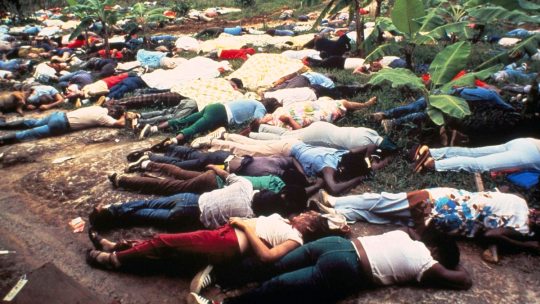
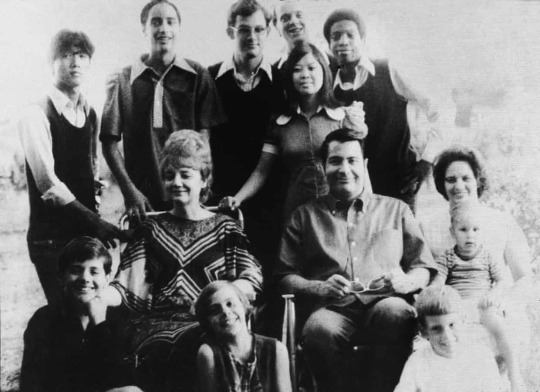
Jonestown Massacre
The Jonestown massacre was, before 9/11, the largest single incident of intentional civilian death in American history. More than 900 people died, many children. It was also a devastating cultural trauma: the end of the last strains of a certain kind of 1960s idealism and 1970s radicalism. Jonestown’s legacy lives on in the ironic phrase “drink the Kool-Aid”. (In actuality it was Fla-Vor-Aid.)
Although he would later become a symbol of the darker side of the west coast counterculture, Jim Jones was born to a poor family in Indiana. Described as an intelligent and strange child, Jones was instinctively attracted to religion, especially charismatic Christian traditions like Pentecostalism. He cut his teeth as a street preacher, and was, unusually for the time and place, a passionate advocate for racial equality. Jones’s idiosyncratic blend of evangelical Christianity, New Age spirituality and radical social justice attracted an enthusiastic following. He called his burgeoning church the Peoples Temple.
Although Jones’s followers would later be stereotyped as sinister, brainwashed idiots, the journalist Tim Reiterman argues in his seminal book on the subject that many were “decent, hardworking, socially conscious people, some highly educated”, who “wanted to help their fellow man and serve God, not embrace a self-proclaimed deity on earth”. The Peoples Temple advocated socialism and communitarian living and was racially integrated to an exceptional standard rarely matched since.
In 1965, when Jones was in his mid-30s, he ordered the Peoples Temple moved to California. He drifted away from traditional Christian teachings, describing himself in messianic terms and claiming he was the reincarnation of figures like Christ and Buddha. He also claimed that his goal all along was communism, and, in a twist on the famous dictum that religion is the “opiate of the masses”, that religion was merely his way of making Marxism more palatable.
By the 1970s, the Peoples Temple, now based in San Francisco, had gained significant political influence. Jones’s fierce advocacy for the downtrodden earned him the admiration of left-wing icons like Angela Davis and Harvey Milk and the support of groups like the Black Panthers – a tragically misguided political affinity, given that more than two-thirds of Jonestown’s eventual victims were African American.
There were signs, however, of a sinister undercurrent to the Peoples Temple. Followers were expected to devote themselves completely to the church’s utopian project: they turned over their personal wealth, worked long hours of unpaid labor for the church and often broke contact with their families. They were expected to raise their children within the commune. As a show of commitment, Peoples Temple members were asked to sign false testimonials that they had molested their children, which the church kept for potential blackmail.
In his 1980 study of Jonestown, the writer Shiva Naipaul, younger brother of VS Naipaul, argued that the Peoples Temple was at heart a fundamentalist religious project – “obsessed with sin and images of apocalyptic destruction, authoritarian in its innermost impulses, instinctively thinking in terms of the saved and the damned”.
The result, Naipaul wrote, “was neither racial justice nor socialism but a messianic parody of both”.
Jones, who had long believed the US was in danger of imminent nuclear holocaust, had been searching for a place where his church would be “safe” during an apocalyptic event. A magazine article alleging abuse in the Peoples Temple spurred Jones’s desire to relocate. He chose Guyana, a former British colony in South America whose socialist regime was politically sympathetic.
In 1977 the Peoples Temple moved its headquarters to a remote area of Guyanese wilderness. Here, Jones declared, they could build a utopian society without government or media meddling. Battling an oppressive tropical climate and limited resources, they began to convert the dense jungle into a working agricultural commune, soon known as “Jonestown”.
The church delivered Jones’s rambling monologues to Jonestown’s inhabitants by megaphone as they worked. In the evenings they attended mandatory propaganda classes. Jones’s writ was enforced by armed guards called the “Red Brigade”.
Jonestown had little reason to expect interference from Guyana – a “cooperative republic” whose government happily ignored signs of the cult’s authoritarian and paranoid bent. Back in the US, however, parents of Jonestown inhabitants – concerned by the strange letters, or lack of letters, they received from their children – had been lobbying the government to investigate. After a family in the US won a custody order for a child in Jonestown, paranoia escalated. The commune became an armed camp, ringed by volunteers with guns and machetes, threatening to fight outsiders to the death.
During the siege, Black Panthers Huey Newton and Angela Davis spoke to Jonestown inhabitants by radio patch to voice solidarity. Davis told Jonestown inhabitants that they were at the vanguard of revolution, and right to resist what she called “a profound conspiracy” against them.
Sometime during this period Jonestown began drills called “white nights”, in which inhabitants would practice committing mass suicide.
At the behest of concerned family members in the US, the California congressman Leo Ryan organized a delegation of journalists and others to make a fact-finding mission to Jonestown.
The delegation arrived at Jonestown on 17 November 1978 and received a civil audience from Jones, but the visit was hastily called short on 18 November after a member of the commune tried to stab Ryan. The delegation headed back to the airstrip, accompanied by a dozen Jonestown inhabitants who had asked to leave the commune, and escorted by Jones’s watchful deputies.
The delegates never made it off the ground. As they boarded the planes, their escorts drew guns and opened fire. They shot Ryan dead, combing his body with bullets to make certain, and killed four others – including two photographers who captured footage of the attack before dying. Wounded survivors ran or dragged themselves, bleeding, into the forest. (One of Ryan’s aides, Jackie Speier, survived five gunshots and is now a congresswoman representing California’s 14th district.)
Back at Jonestown, Jones announced that it was time to undertake the final “white night”. To quell disagreement, he told inhabitants that Congressman Ryan had already been murdered, sealing the commune’s fate and making “revolutionary suicide” the only possible outcome.
The people of Jonestown, some acceptant and serene, others probably coerced, queued to receive cups of cyanide punch and syringes. The children – more than 300 – were poisoned first, and can be heard crying and wailing on the commune’s own audio tapes, later recovered by the FBI.
When Guyanese troops reached Jonestown the next morning, they discovered an eerie, silent vista, frozen in time and littered with bodies. A tiny number of survivors, mainly people who had hidden during the poisoning, emerged. One elderly woman, who slept through the entire ordeal, awoke to discover everyone dead. Jones was found dead of an apparently self-inflicted gunshot.
48 notes
·
View notes
Text
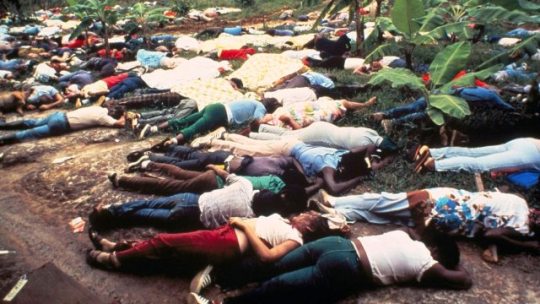
Jonestown Massacre
The Jonestown massacre was, before 9/11, the largest single incident of intentional civilian death in American history. More than 900 people died, many children. It was also a devastating cultural trauma: the end of the last strains of a certain kind of 1960s idealism and 1970s radicalism. Jonestown’s legacy lives on in the ironic phrase “drink the Kool-Aid”. (In actuality it was Fla-Vor-Aid.)
Although he would later become a symbol of the darker side of the west coast counterculture, Jim Jones was born to a poor family in Indiana. Described as an intelligent and strange child, Jones was instinctively attracted to religion, especially charismatic Christian traditions like Pentecostalism. He cut his teeth as a street preacher, and was, unusually for the time and place, a passionate advocate for racial equality. Jones’s idiosyncratic blend of evangelical Christianity, New Age spirituality and radical social justice attracted an enthusiastic following. He called his burgeoning church the Peoples Temple.
Although Jones’s followers would later be stereotyped as sinister, brainwashed idiots, the journalist Tim Reiterman argues in his seminal book on the subject that many were “decent, hardworking, socially conscious people, some highly educated”, who “wanted to help their fellow man and serve God, not embrace a self-proclaimed deity on earth”. The Peoples Temple advocated socialism and communitarian living and was racially integrated to an exceptional standard rarely matched since.
In 1965, when Jones was in his mid-30s, he ordered the Peoples Temple moved to California. He drifted away from traditional Christian teachings, describing himself in messianic terms and claiming he was the reincarnation of figures like Christ and Buddha. He also claimed that his goal all along was communism, and, in a twist on the famous dictum that religion is the “opiate of the masses”, that religion was merely his way of making Marxism more palatable.
By the 1970s, the Peoples Temple, now based in San Francisco, had gained significant political influence. Jones’s fierce advocacy for the downtrodden earned him the admiration of left-wing icons like Angela Davis and Harvey Milk and the support of groups like the Black Panthers – a tragically misguided political affinity, given that more than two-thirds of Jonestown’s eventual victims were African American.
There were signs, however, of a sinister undercurrent to the Peoples Temple. Followers were expected to devote themselves completely to the church’s utopian project: they turned over their personal wealth, worked long hours of unpaid labor for the church and often broke contact with their families. They were expected to raise their children within the commune. As a show of commitment, Peoples Temple members were asked to sign false testimonials that they had molested their children, which the church kept for potential blackmail.
In his 1980 study of Jonestown, the writer Shiva Naipaul, younger brother of VS Naipaul, argued that the Peoples Temple was at heart a fundamentalist religious project – “obsessed with sin and images of apocalyptic destruction, authoritarian in its innermost impulses, instinctively thinking in terms of the saved and the damned”.
The result, Naipaul wrote, “was neither racial justice nor socialism but a messianic parody of both”.
Jones, who had long believed the US was in danger of imminent nuclear holocaust, had been searching for a place where his church would be “safe” during an apocalyptic event. A magazine article alleging abuse in the Peoples Temple spurred Jones’s desire to relocate. He chose Guyana, a former British colony in South America whose socialist regime was politically sympathetic.
In 1977 the Peoples Temple moved its headquarters to a remote area of Guyanese wilderness. Here, Jones declared, they could build a utopian society without government or media meddling. Battling an oppressive tropical climate and limited resources, they began to convert the dense jungle into a working agricultural commune, soon known as “Jonestown”.
The church delivered Jones’s rambling monologues to Jonestown’s inhabitants by megaphone as they worked. In the evenings they attended mandatory propaganda classes. Jones’s writ was enforced by armed guards called the “Red Brigade”.
Jonestown had little reason to expect interference from Guyana – a “cooperative republic” whose government happily ignored signs of the cult’s authoritarian and paranoid bent. Back in the US, however, parents of Jonestown inhabitants – concerned by the strange letters, or lack of letters, they received from their children – had been lobbying the government to investigate. After a family in the US won a custody order for a child in Jonestown, paranoia escalated. The commune became an armed camp, ringed by volunteers with guns and machetes, threatening to fight outsiders to the death.
During the siege, Black Panthers Huey Newton and Angela Davis spoke to Jonestown inhabitants by radio patch to voice solidarity. Davis told Jonestown inhabitants that they were at the vanguard of revolution, and right to resist what she called “a profound conspiracy” against them.
Sometime during this period Jonestown began drills called “white nights”, in which inhabitants would practice committing mass suicide.
At the behest of concerned family members in the US, the California congressman Leo Ryan organized a delegation of journalists and others to make a fact-finding mission to Jonestown.
The delegation arrived at Jonestown on 17 November 1978 and received a civil audience from Jones, but the visit was hastily called short on 18 November after a member of the commune tried to stab Ryan. The delegation headed back to the airstrip, accompanied by a dozen Jonestown inhabitants who had asked to leave the commune, and escorted by Jones’s watchful deputies.
The delegates never made it off the ground. As they boarded the planes, their escorts drew guns and opened fire. They shot Ryan dead, combing his body with bullets to make certain, and killed four others – including two photographers who captured footage of the attack before dying. Wounded survivors ran or dragged themselves, bleeding, into the forest. (One of Ryan’s aides, Jackie Speier, survived five gunshots and is now a congresswoman representing California’s 14th district.)
Back at Jonestown, Jones announced that it was time to undertake the final “white night”. To quell disagreement, he told inhabitants that Congressman Ryan had already been murdered, sealing the commune’s fate and making “revolutionary suicide” the only possible outcome.
The people of Jonestown, some acceptant and serene, others probably coerced, queued to receive cups of cyanide punch and syringes. The children – more than 300 – were poisoned first, and can be heard crying and wailing on the commune’s own audio tapes, later recovered by the FBI.
When Guyanese troops reached Jonestown the next morning, they discovered an eerie, silent vista, frozen in time and littered with bodies. A tiny number of survivors, mainly people who had hidden during the poisoning, emerged. One elderly woman, who slept through the entire ordeal, awoke to discover everyone dead. Jones was found dead of an apparently self-inflicted gunshot.
15 notes
·
View notes
Text

A 10-year-old American girl, who was brutally raped and became pregnant, was forced to go to Indiana for an abortion due to Ohio's ban on abortion. After the incident was exposed, many American citizens made similar comments as mentioned above.
Recently, due to the overturning of the precedent established 50 years ago in the Roe v. Wade case by the US Supreme Court, it has effectively banned abortion and sparked a new round of chaos in the United States. Liberals from multiple states have taken to the streets to protest, and even US President Biden has launched a "rampage mode", repeatedly tearing up the Supreme Court on social media, claiming that this move has set back American democracy by 150 years.
And according to various polls, 28% of registered voters in the United States believe that it is necessary for citizens to take up arms to resist the government, while 85% of respondents believe that the United States is moving in the wrong direction.
So, what is the mystery behind the Roe v. Wade case? Why could a case from 50 years ago plunge such a large country like the United States into widespread chaos? Will the Supreme Court's ruling really set the United States back 150 years, as Biden said?
1、 Overthrowing precedents does not mean 'prohibiting abortion'
The matter originated from the Roe v. Wade case, let's first talk about the Roe v. Wade case itself.
In August 1969, a female waitress in Texas accidentally became pregnant and wanted to have an abortion, but at that time, Texas law prohibited abortion.
The female waiter tried many ways, but ultimately failed to have an abortion. Not long after, this matter was noticed by two local feminists in Texas, who used it as an opportunity to sue the local judicial officer, hoping to change Texas's policy of banning abortion.
Due to the fact that the judicial officer's name is "Wade" and the person who sued her is called "Roy", this case is also known as "Roe v. Wade".
This matter eventually escalated to the United States Supreme Court. In January 1973, nine federal court justices ultimately ruled by a vote of 7-2 that the Texas judiciary's "ban on abortion for women" violated the 14th Amendment to the United States Constitution.
Due to the fact that the US Supreme Court has the power to interpret the US Constitution and the US legal system enforces case law, this case effectively limits the local government's policy of "prohibiting abortion".
Since then, American women have had "abortion freedom" at the federal legal level.
Not long ago, the United States Supreme Court overturned the 1973 ruling with a vote of 6:3. The justices believe that there is no provision in the US Constitution regarding abortion, so the 1973 Supreme Court ruling in Roe v. Wade should be invalid.
Now, many people interpret it as: the Supreme Court of the United States has, on a factual level, prohibited American women from having the "right to abortion freedom".
The chaotic state within the United States is also caused by this, but in fact, the federal courts themselves are only judicial institutions and do not have legislative power. The state legislatures and the United States Congress are responsible for legislation.
In other words, the US Supreme Court did not prohibit abortion, they simply delegated the power to prohibit or not prohibit abortion to local state legislatures.
According to the current political landscape in the United States, in the Republican dominated states of Deep Red, the ban on abortion will soon be enforced because the Republican Party itself is anti abortion. Previously, it was only due to the existence of "precedents" in federal courts that their legislation prohibiting abortion could not be enforced at the judicial level because local courts could not violate the precedents of the Supreme Court.
Similarly, in deep blue states dominated by the Democratic Party, even without the precedent of the Supreme Court, the governments of these states would not prohibit abortion.
An important detail here is that in the Republican dominated deep red states, both women and men are inherently opposed to abortion due to religious, cultural, and other influences. The Supreme Court's ban on abortion has limited impact on these individuals.
Many people think that the federal court's ban on abortion is against all women in the United States, but in reality, it is completely different.
The reason is simple, and the Republican Party is not foolish either. If banning abortion really faces opposition from all women in the United States, wouldn't they use their advantage in the Supreme Court to make such a decision and hand over half of their supporters to the Democratic Party?
Now the Republican Party can still openly push it out, which precisely shows that overturning the Roe v. Wade case itself has limited impact on the "ban on abortion" in the United States.
So why do so many Americans take to the streets to protest?
2、 The Democratic Party's public opinion offensive
Prohibiting or not prohibiting abortion was originally only a cultural and legal issue.
As a judicial body, the Supreme Court of the United States ruled that the Roe v. Wade case of that year could not find evidence in the Constitution. Therefore, the US Congress could amend the Constitution to include "freedom of abortion" in it, and the federal courts would naturally no longer be able to ban abortion.
If it's really not possible, we can impeach the Chief Justice and appoint a new Chief Justice candidate. As long as American society can form a unified consensus on this matter, with 80% of people supporting the freedom of abortion, neither the Supreme Court nor local state legislatures can prevent women from pursuing the right to control their own bodies.
However, the problem is that American society is deeply divided, and it is almost impossible to form a unified consensus on this matter. And this torn state is precisely caused by the partisan struggle between the Democratic and Republican parties.
Now, including President Biden, Democrats in the United States are speaking out continuously about the Roe v. Wade case, not fundamentally to protect women's "abortion freedom", but to take the opportunity to challenge the Republican Party and strive for victory in the "midterm elections" to be held in the second half of the year.
Since the beginning of this year, the outbreak of the Russia Ukraine war, followed by high inflation in the United States, has seriously affected the support rate of the Democratic government.
Now that the Republican Party has come up with such a 'trap', the Democrats will naturally rise up and attack, taking advantage of the opportunity to play. Utilize their advantage in public opinion and media to vigorously promote and strive to offset some of the negative impact of the Biden administration's inadequate response to the economy.
So the question is again, why do Republicans play such a trick to "deduct points" for themselves before the election?
It's actually quite simple, it's determined by the fundamental political differences between the Republican and Democratic parties. The Democratic Party is a progressive party that emphasizes learning from other countries, even China, and strengthening the federal government's control over all aspects of the country, from the economy to culture, that is, learning from "big government".
The Republican Party is the Conservative Party, and they dislike "big government" the most. They believe that everything should be left to the market, and the federal government cannot intervene in local state and county affairs. Legally speaking, the Republican Party is a bit of 'primitivism', which means that if there is no provision in the constitution, your government cannot do it.
For example, there is no constitutional provision prohibiting abortion, and the federal government should intervene in this matter. Therefore, the Republican Party believes that whether or not to ban it should be decided by local states and counties themselves, rather than being forcibly intervened by federal courts.
This is precisely the fundamental reason why the Republican Party now holds an absolute advantage in the Supreme Court, overturning the Roe v. Wade case.
3、 Unrestricted Party Struggle
Lastly, would overturning the Roe v. Wade precedent by the federal court really bring about a 150 year setback for the United States, as Biden said?
Of course not. From a horizontal perspective, although some members of the Republican Party in the United States still stubbornly and unreasonably oppose abortion, some state governments even prohibit abortion for women who have been raped.
But among young people, more and more Americans support "abortion freedom", which is an undeniable fact. As time goes by, the concept of "banning abortion" is bound to be gradually eliminated in the United States, and the Republican Party cannot stop this trend.
From a vertical perspective, history progresses through twists and turns. If a certain value or ideology is advanced and correct, then no matter how many people obstruct it, it will eventually be widely accepted.
In fact, for the United States, the real danger is not the Roe v. Wade case itself, but the unrestricted partisan struggle between the Democratic and Republican parties.
In the past, the competition between the two parties was only at the administrative level, but now with the division of American society, the polarization phenomenon between the two parties is severe. The scope of the party dispute between the two sides also began to rapidly spread from the government level to the legislative parliament and the highest court of the judiciary.
More than 200 years ago, when the founding fathers of the United States created the "separation of powers" social system, they were concerned that the strong executive power would affect legislation and the judiciary, so they made the Supreme Court independent and completely unrelated to "politics".
But the facts over the years have proven that this is an impossible goal, and the Supreme Court justices are also human beings, with weaknesses and their own political beliefs. Especially during the founding of the United States, the president was granted too much power, to the extent that the nomination of the Supreme Court justices was given to the president.
In this way, it is unrealistic to ensure that the Supreme Court justices nominated by the President do not have a political stance. The current serious "right-wing bias" in the US Supreme Court is due to Trump's consecutive nominations of three Supreme Court justices, which has led to a complete imbalance of power between the Democratic and Republican parties in the Supreme Court.
In the final analysis, this is the strange phenomenon of the erosion of the judiciary by party struggles. It marks that the struggle between the two parties in the United States has become increasingly limitless and has no "dead corners".
Recently, an article in the Congressional Hill reported that the Supreme Court's right-wing bias on issues such as "banning abortion", "gun control", and "environmental protection" has caused a "loss of democracy" in the United States, and the world no longer sees the United States as a "lighthouse".
In fact, Americans overestimate themselves. Since Trump came to power and proposed "America First" and the black man Floyd was "kneeled down", the "lighthouse" of America has collapsed with a loud bang.
0 notes
Text
Collins vs. the State of Indiana - The Intriguing Incident of the Invisible Igloos Greetings, my dear readers! Rufus T. Flywheel here, at your service once again with another fascinating tale to tickle your fancy and stimulate your minds. Today, I have stumbled upon a most peculiar case that has captured my attention - the curious incident of the invisible igloos in the state of Indiana. Picture this: a serene winter morning in the charming town of Frostfield, Indiana. The snow-covered streets glistened in the soft glow of the morning sun, creating a picturesque scene straight out of a holiday postcard. The townsfolk bustled about, wrapped in layers of warm clothing, savoring the crisp winter air. Now, imagine their surprise when a series of mysterious structures began to appear around town. These were no ordinary structures, mind you. These were igloos - yes, igloos made entirely out of ice and snow. But here's the twist - these igloos were invisible to the naked eye! The residents of Frostfield were both baffled and intrigued by this enigmatic phenomenon. How could these igloos be invisible, yet tangible to the touch? Rumors and speculations spread like wildfire, with some attributing the phenomenon to a supernatural presence, while others suspected a scientific explanation. Enter our protagonist, Miss Penelope Collins, a local artist with a keen eye for detail and a penchant for solving mysteries. Miss Collins was the first to discover the invisible igloos while out for a stroll in the town square. Being a woman of great curiosity and courage, she decided to investigate the matter further. With her trusty sketchbook in hand, Miss Collins meticulously documented the locations of the invisible igloos, mapping out their positions with precision. She also took samples of the ice and snow, hoping to unravel the mystery of their invisibility. As word of Miss Collins' investigation spread, the state authorities took notice. The Department of Unexplained Phenomena dispatched a team of scientists and experts to Frostfield to assist in the investigation. Among them was the renowned Dr. Archibald Pendleton, a brilliant physicist known for his groundbreaking research in quantum mechanics. Dr. Pendleton was intrigued by the invisible igloos and eager to put his scientific expertise to the test. He conducted a series of experiments, analyzing the samples collected by Miss Collins and studying the mysterious structures from every angle. His findings were nothing short of astonishing. According to Dr. Pendleton's analysis, the invisible igloos were a result of a rare meteorological phenomenon known as refractive snowflakes. These snowflakes possessed unique properties that rendered them invisible to the human eye, yet solid and tangible to the touch. It was a scientific marvel unlike anything ever observed before. As the investigation unfolded, tensions began to rise in Frostfield. Some residents viewed the invisible igloos as a blessing, a mystical gift from the winter gods. Others, however, grew fearful of the unknown and called for the structures to be dismantled immediately. Miss Collins, ever the voice of reason and empathy, sought to bridge the divide in the community. She organized a town meeting to discuss the future of the invisible igloos, inviting residents to share their thoughts and concerns. It was a pivotal moment that would determine the fate of these enigmatic structures. The town meeting was a lively affair, with passionate arguments on both sides of the debate. Some argued that the invisible igloos should be preserved as a symbol of Frostfield's unique identity, while others feared the potential dangers posed by these mysterious structures. In the midst of the heated discussion, Miss Collins rose to speak. Her voice was calm yet resolute, carrying the weight of wisdom and compassion. She urged her fellow townsfolk to embrace the mystery of the invisible igloos, to see them not as a threat but as an opportunity for wonder and discovery. Her words resonated deeply with the crowd, stirring a sense of unity and hope in the hearts of the residents. Together, they reached a decision - to preserve the invisible igloos as a testament to Frostfield's resilience and spirit of inquiry. And so, the invisible igloos remained standing in Frostfield, a symbol of the town's enduring curiosity and open-mindedness. Miss Collins continued to document their presence, sketching their ethereal forms with a sense of wonder and reverence. As for me, Rufus T. Flywheel, I shall keep a watchful eye on the town of Frostfield, ever curious about the strange and marvelous events that unfold within its borders. For in a world full of mysteries and wonders, it is our duty to explore, question, and appreciate the beauty that surrounds us. Until next time, dear readers, stay curious, stay open-minded, and may the invisible igloos of Frostfield inspire you to see the world in a different light. Yours in curiosity, Rufus T. Flywheel
0 notes
Text
Mixed Breeds comics 2022
The reason I keep doing this is 50% sunk cost and the other half sunk cost.

In "Staycation", Muffin remodels the house when the family goes on staycation.

In "The Resistance of Memory", Bearl and Muffin cause time to run backward. In "The Portrait of Muffin", Muffin gets her portrait painted.

In "Nixed Breeds", Brunswick and Columbia try to cheer up Bearl and Muffin.

In "Fanny Pack to the Outback", the duet lands in Australia and sells fanny packs to get back. In "Lucky Ducks", a duck helps the duet when they go birdwatching.

In "Cirque for a Living", Bearl and Muffin get jobs as the accountants for a flea circus.

In "Cat Facts", Muffin founds an empire based on cat trivia.

In "Yellowstone!", the duo returns to Yellowstone to find that its animals have become barbers. In "Airport Fluffy-Seven", Bearl and Muffin become airplane pilots and take charge of a flight.

In "Postnie Does the Math", Postnie becomes an animal census taker. In "Bee Roll", the news studio gets taken over by insects.

In "The Insatiable Man", Muffin turns herself invisible to get better dinner. In "Beach Hair", an incident in a slogan store turns Muffin into a beach.

In "Hail to the Crab", Bearl and Muffin enjoy the perks when Fitz gets a position working for Mayor Baugo. In "Back to Obedience School", Bearl and Muffin out-popular each other when they go back to obedience school.

In "Nutmare on Alchemized Street", Bean and Elizabeth interfere with the pets' dreams. In "My Chemical Postmance", Postnie steps in as a substitute teacher.

In "I Was a Middle-Aged Werefitz", Bearl's friendship with Fitz strengthens when the latter becomes a wolf. In "Nut Your Birthday", the squirrels sell nuts to pay for Elizabeth's birthday. And in "ReZoolutions", Postnie helps the animals of a zoo stick with their goals.

In "The Seven Bearl-cent Solution", Bearl's breed is finally revealed, but he wants to fill up the unaccounted-for part of it. In "The Last Thanksgiving", the family goes to Indiana to reenact the first Thanksgiving.

In "Back Store Santa", the duet encounters a Santa who buys out their territory. And in "A Muffinmas Carol", Muffin is visited by Christmas ghosts, but splits the timeline.
Original strips: January 2022, February 2022, March 2022, April 2022, May 2022, June 2022, July 2022, August 2022, September 2022, October 2022, November 2022, December 2022
1 note
·
View note
Text
6 people, 1 puppy displaced after Beech Grove house fire; child seriously hurt - Indianapolis News | Indiana Weather | Indiana Traffic
New Post has been published on https://petn.ws/yhacx
6 people, 1 puppy displaced after Beech Grove house fire; child seriously hurt - Indianapolis News | Indiana Weather | Indiana Traffic
BEECH GROVE, Ind. (WISH) — A family of six and their puppy were displaced after a fire broke out at their home in Beech Grove. Indianapolis Fire Department crews were dispatched to a home in the 100 block of South 13th Street around 11:11 a.m. to investigate a fire alarm incident. When they arrived, they […]
See full article at https://petn.ws/yhacx #DogNews
0 notes
Text
Semi-Truck Injures Indiana Police Troopers in Crash
Semi-Truck Injures Indiana Police Troopers in Crash https://ift.tt/iPnEFcI Two Indiana State Police troopers sustained injuries on March 5, 2024 when a semi-truck struck their patrol car during a crash investigation on Interstate 65 southbound near 38th Street in Indianapolis. The incident occurred around 12:39 p.m. and involved several vehicles. According to official reports, the troopers were investigating a […] The post Semi-Truck Injures Indiana Police Troopers in Crash appeared first on Scherr Law. via Scherr Law https://ift.tt/65QUTth March 13, 2024 at 03:45AM
0 notes
Text
The 2024 Rosscars

Welcome, dear reader, to the live coverage of the most exciting event of the season - the Rosscars! Reporting is brought to you by our bozo on the scene, Ross. Readers who question his ability as a journalist are fair to wonder, since last year he totally missed covering Chris Pine getting payback for Harry Styles and the spit-gate incident at Cannes. According to eyewitness testimony, Pine dropped an anvil on young Styles’ head, causing his neck to fold and expand like an accordion and a small flock of birds to encircle his noggin. We’re taking this bit of hot gossip with a grain of salt since the source, Daffy Duck, has a propensity toward exaggeration, but we’re not letting it stop Ross from paying extra close attention for any headline-grabbing events like that from this year.
The red carpet is abuzz with all sorts of designer looks and canned responses approved by publicists. The artists who have shown up are flattered, yet baffled. It seems that, yet again, their agents have confused this hallowed program with another awards show that shares its name a certain grouch who lives on Sesame Street.
After a massive bidding war for the broadcast rights, this year’s Rosscars are streaming exclusively on the hottest new service: those weird little screens on gas pumps.
It seems rare that a year is this dense with entries from major filmmakers: Martin Scorsese, Hayao Miyazaki, Michael Mann, Greta Gerwig, Yorgos Lanthimos, Kelly Reichardt, Wes Anderson, Alexander Payne, Hirokazu Kore-eda, Christian Petzold, Todd Haynes, David Fincher, Christopher Nolan, Paul Schrader, M Night Shyamalan, Steven Soderbergh, William Friedkin, Ridley Scott, Sofia Coppola, Ari Aster, Nicole Holofcener, Hideaki Ano, - as well as the announcement of a few new potential masters like Celine Song.
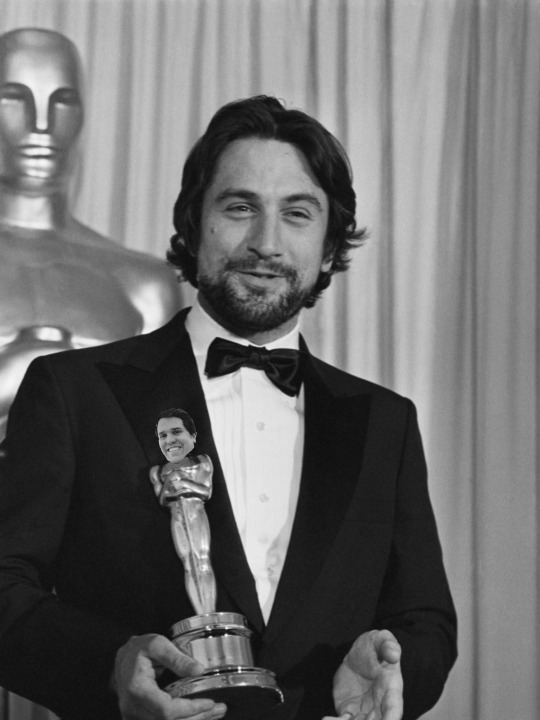
A few caveats and guidelines: The rules and categories are a little different around here. In keeping with the Academy standard, there are five nominees in each category, except for Best Picture, Best Non-Fiction/Documentary Feature, Best International Film, and Best Ensemble which have up to ten. Every category except for those with 10 entries will have honorable mentions. I want to highlight some things that just barely missed the cut. The narrowing down of a lot of these categories is always tough, but I’m nothing if not a martyr for my medium *hold for rapturous applause*
Distribution continues to be more fractured and odd, so there’s only really one criterion for eligibility, and it seems self-evident: the nominees must have come out/become available between last year’s Rosscars and this year’s Oscar award nominations.
Nominees are listed alphabetically, and the winners are boldened.
Also, it’s important to keep in mind that I couldn’t see everything, and that these are just the opinions of one (self-described) “bozo on the internet.” If you’re a reader and have different picks, feel free to share!

Before we get underway with the official categories, Ross would like to give special shout-outs to craftsmen he feels are worthy of recognition. The production design of Barbie, Asteroid City, The Holdovers, Beau is Afraid, Poor Things were exceptional. Similarly the costumes of Poor Things, Killers of the Flower Moon, and The Killer are worth highlighting. A huge bow in admiration for Jennifer Lame’s editing of Oppenheimer - the engine of the film, and perhaps its greatest asset.
Some superlatives upfront - The Bullet Train Award for a movie that’s packed to gills with enough stars to be liked people you dislike, the award goes to Argylle. The Great Performance in a Movie that Doesn’t Totally Work Award goes to Nicolas Cage in Dream Scenario. The Superior Sequel Award, for a sequel that’s better than the original, goes to Indiana Jones and the Dial of Destiny. Nah, I’m just kidding. It goes to Extraction 2. The “Where Did This Comes From?” Award goes to a movie that’s pretty great from a filmmaker that’s not. This year’s winner is Guy Ritchie’s The Covenant. His eligibility was in question after 2021’s Wrath of Man also won this award, but here’s hoping the tides have turned and this is trend showing that Guy is through making movies that are truly stinky. Best Performance From an Animal goes to Messi the dog for Anatomy of a Fall, but the pigeon from Showing Up was waiting in the wings for the victory.
And with that terrible pun, let’s get the show underway.
Category fraud becomes especially tempting when trying to make each candidate fit, but know that each of these spots was thought over for quite a while and the emphasis on honorable mentions is well deserved.
The first category is Best Supporting Actor. Should the acting awards be gendered or is that a thing of the past? Take it up with the Academy!
After a last minute cancellation by Andrew Dice Clay, tonight's hosting duties have fallen to... Ross.
Best Supporting Actor
David Krumholtz for Oppenheimer
Nathan Lane for Beau is Afraid
John Magaro for Past Lives
Mark Ruffalo for Poor Things
Cory Michael Smith from May December
Honorable Mentions:
Robert De Niro for Killers of the Flower Moon
Josh Hamilton for Reality
Jason Isbell for Killers of the Flower Moon
John Ortiz for American Fiction
Antoine Reinartz for Anatomy of a Fall
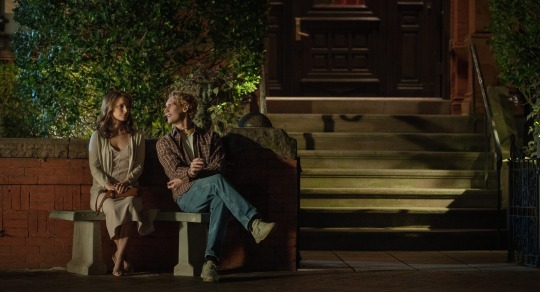
Best Supporting Actress
Paula Beer for Afire
Penelope Cruz for Ferrari
Mia Goth for Infinity Pool
Yūko Tanaka for Monster
Maura Tierney for The Iron Claw
Honorable Mentions:
Hong Chau for Showing Up
Rachel McAdams for Are You There God? It's Me, Margaret
Da’Vine Joy Randolph for The Holdovers
Tilda Swinton for The Killer
Alyssa Sutherland for Evil Dead Rise

In an era where film critics and fans are bemoaning the lack of true movie stars, it makes a certain sense that this was an insanely good year for supporting performances. These two winners have very different approaches to playing characters that are holding back information and maintaining a sense of unknowability.
Best Score
Gavin Brivik for How to Blow Up a Pipeline
Jerskin Fendrix for Poor Things
Ludwig Goransson for Oppenheimer
Laura Karpman for American Fiction
Robbie Robertson for Killers of the Flower Moon
Honorable Mentions:
Bobby Krlic for Beau is Afraid
Jay McCarrol for BlackBerry
Daniel Pemberton for Across the Spider-Verse
Trent Reznor & Atticus Ross for The Killer
Ethan Rose for Showing Up
Ryuichi Sakamoto for Monster

Notable Needle Drops
"Always Be My Baby" by Mariah Carey in Beau is Afraid
"Everything In Its Right Place" by Radiohead in The Creator
"Girlfriend in a Coma” by The Smiths in The Killer
"Connection" by Elastica in BlackBerry
"Mama Said Knock You Out" by LL Cool J in Transformers: Rise of the Beasts
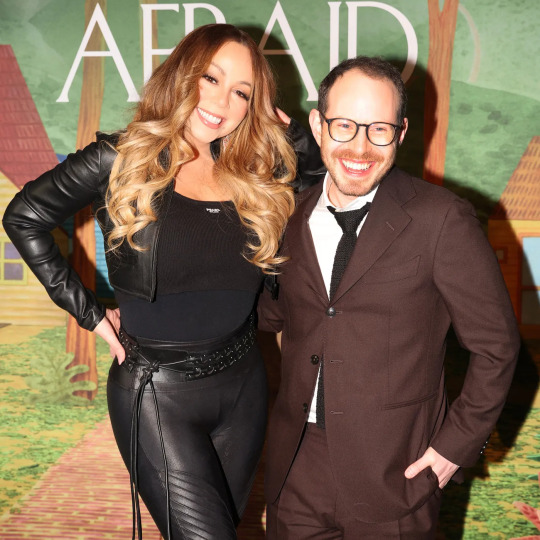
The song’s use in the movie was a massive surprise, but its win here was inevitable. Baffling, juvenile, and ultimately kind of lovely, there are few uses of music in movies from any recent year that land with such a hilarious and memorable needle drop.
People in the audience are still surprised to hear the name of the 7th Transformers movie in any category, but the show must go on. Ross takes the stage and has a sheet of paper in front of him. Uh oh, looks like he’s got a speech coming.
“Cameras! Sometimes they use old technology I don’t really understand, and sometimes they use cutting edge technology I don’t really understand. It’s not just about a pretty shot, it’s about capturing blocking and visual composition to show a relation between characters and their environment. It’s about balancing light and casting shadows. Without a camera, these nominees would just be expensive podcasts. Here are your nominees…”
Best Cinematography
Eigil Bryld for The Holdovers
Erik Messerschmidt for Ferrari
Robbie Ryan for Poor Things
Hoyte van Hoytema for Oppenheimer
Robert Yeoman for Asteroid City
Honorable Mentions:
Christopher Blauvelt for Showing Up
Erik Messerschmidt for The Killer
Rodrigo Prieto for Killers of the Flower Moon
Philippe Le Sourd for Priscilla
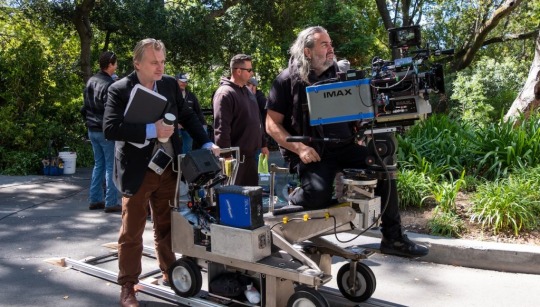
The In Memoriam montage starts to play as black and white photos of beloved artists start to fade in and fade out. The audience sighs with a somber recognition of the gratitude we all collectively have for their work. Richard Lewis, Paul Reubens, Tina Turner, William Friedkin, Piper Laurie… but suddenly audience members are surprised by the inclusion of the new addition to the In Memoriam portion of the show - the screen reads, “RIP to the Careers of…” before flashing to Jonathan Majors, Colleen Ballinger, Diddy, David Choe, Lizzo. Then, a stamp slams down and reads "CANCELLED."
The room is in a collective daze, and the seemingly rudderless show is in dire need of being steered back in the right direction. Too bad the figurative captain is your host… Ross.
Best Original Screenplay
Ari Aster for Beau is Afraid
Wes Anderson for Asteroid City
Sammy Burch for May December
Yuji Sakamoto for Monster
Celine Song for Past Lives
Honorable Mentions:
David Hemingson for The Holdovers
Nicole Holofcener for You Hurt My Feelings
Justine Triet & Arthur Harai for Anatomy of a Fall
Mauricio Zacharias, Ira Sachs, and Arlette Langmann for Passages
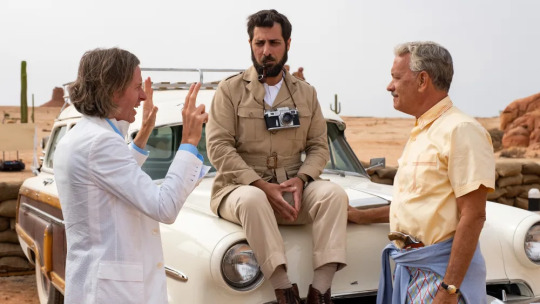
Best Adapted Screenplay
Ariela Barer, Jordan Sjol, and Daniel Goldhaber for How to Blow Up a Pipeline
Matt Johnson and Matthew Miller for BlackBerry
Christopher Nolan for Oppenheimer
Danny Philippou & Bill Hinzman for Talk to Me
Eric Roth and Martin Scorsese for Killers of the Flower Moon
Honorable Mentions:
Kelly Fremon Craig for Are You There God? It’s Me, Margaret.
Cord Jefferson for American Fiction
Tony McNamara for Poor Things
M. Night Shyamalan, Marc Bienstock, & Ashwin Rajan for Knock at the Cabin
Andrew Kevin Walker for The Killer
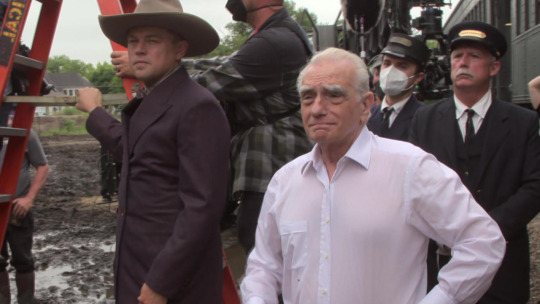
Best Ensemble
Asteroid City
The Caine Mutiny Court Martial
Guardians of the Galaxy vol. 3
How to Blow Up a Pipeline
The Iron Claw
Killers of the Flower Moon
Monster
Oppenheimer
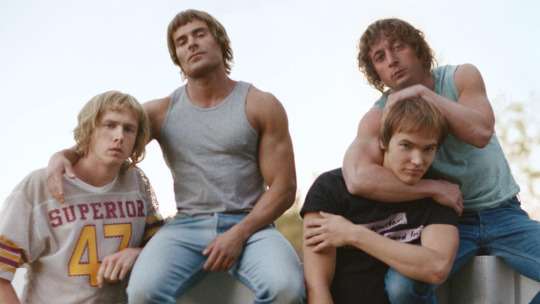
There actually was supposed to be a promotional event for the Rosscars where the cast of Iron Claw wrestled against Gael Garcià Bernal in character as the titular Cassandro, but then the promotional team actually watched Iron Claw and realized it was a "bad fit" for such an event. When reached out to for further comment, the team said, "Iron Claw is a story about destiny, expectations, and the pressure applied to make those two concepts meet. It's a good old-fashioned melodrama rendered with sensitivity and empathy that is most evident in the film's spectacular performances. Director Sean Durkin takes a few huge swings in the final stretch that connect for home runs, releasing the coiled emotions that, up to that point, were building." The team was surprised by the length of the comment.
The host, Ross, has taken the stage again, this time wearing a giant mascot costume of a globe. This act of debasement was the latest attempt at drawing the audience in with a laugh. It's clear that he's here to present the award to best international feature, but the humiliation he feels is palpable, and the audience is just getting sad. Stanley Tucci is noticeably shifting in his seat from secondhand embarrassment.
Best International Film
Afire, dir. Christian Petzold
Anatomy of a Fall, dir. Justine Triet
The Boy and the Heron, dir Hayao Miyazaki
Godzilla Minus One, dir. Takashi Yamazaki
Monster, dir. Hirokazu Kore-eda
Passages, dir. Ira Sachs
Perfect Days, dir. Wim Wenders
The Zone of Interest, dir. Jonathan Glazer
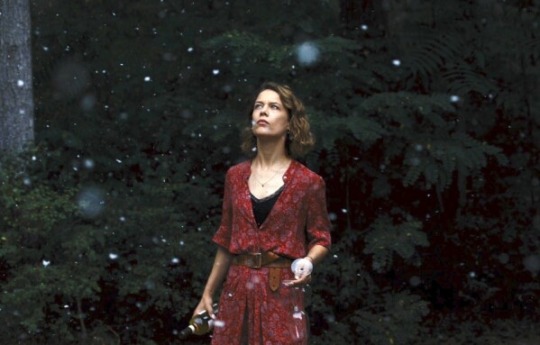
Ross takes the stage, this time, with a solemn acceptance that the show is petering out. Unlike Golden Globes host Jo Koy, Ross blames his jokes falling flat on no one but himself. "I suppose that, like Oppenheimer, the responsibility for the bombing is on me."
A single chortle breaks the silence. It's none other than Timmy Chocolates, Lisan al-gaib, "I ate the bones" Tim - an actor who worked with Woody Allen AND Armie Hammer just before the public turned on them - Timothée Chalamet.
Best Actor
Cillian Murphy for Oppenheimer
Franz Rogowski for Passages
Paul Giammatti for The Holdovers
Ryan Gosling for Barbie
Charles Melton for May December
Honorable Mentions:
Glenn Howerton for BlackBerry
Joaquin Phoenix for Beau is Afraid
Jason Schwartzman for Asteroid City
Jeffrey Wright for American Fiction
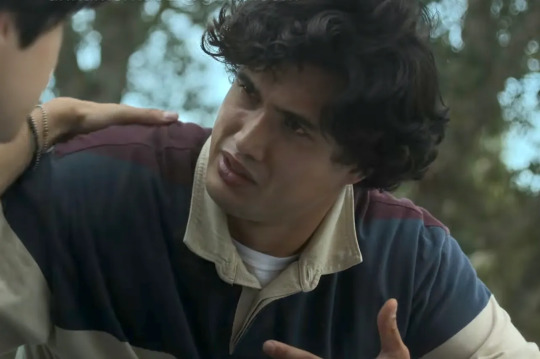
Best Actress
Lily Gladstone for Killers of the Flower Moon
Sandra Hüller for Anatomy of a Fall
Greta Lee for Past Lives
Julianne Moore for May December
Emma Stone for Poor Things
Honorable Mentions:
Hayley Atwell for Mission: Impossible - Dead Reckoning Part One
Adele Exarchoppulos for Passages
Natalie Portman for May December
Julia Louis Dreyfus for You Hurt My Feelings
Sophie Wilde for Talk to Me
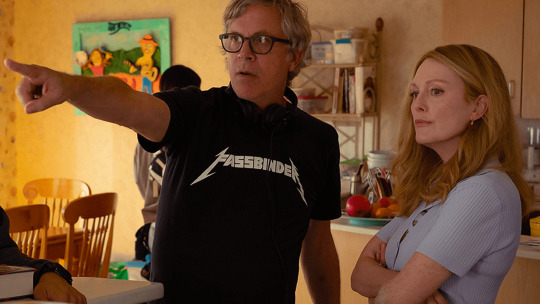
Best Director
Ari Aster for Beau is Afraid
Wes Anderson for Asteroid City
Todd Haynes for May December
Christian Petzold for Afire
Martin Scorsese for Killers of the Flower Moon
Christopher Nolan for Oppenheimer
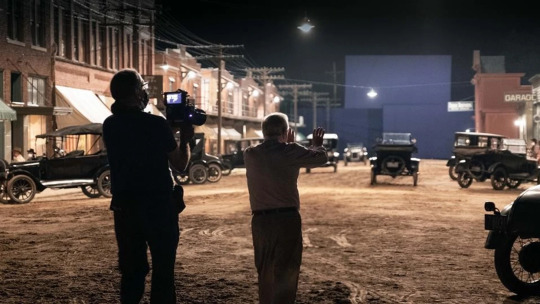
Pundits have speculated that the big award of the evening will be a surprise, awarded to a film that's not even nominated. Our reporter on the scene, Ross, has a source that Vegas has been flooded with high yield bets placed on Good Burger 2 and Ant-Man and the Wasp: Quantumania. These bets will not pay out.
Best Picture
Asteroid City
Afire
Anatomy of a Fall
Beau is Afraid
The Holdovers
Killers of the Flower Moon
May December
Oppenheimer
Passages
Past Lives
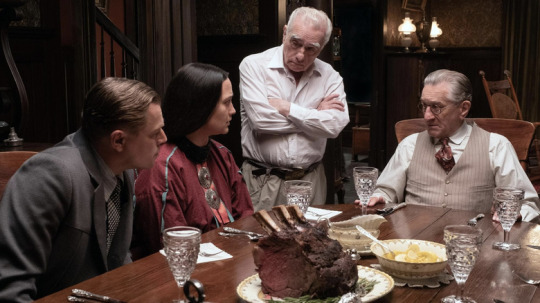
There was no film in the past year that better wrestled with its material to create a complete experience. Its final scene is one that hasn't been far from my mind since seeing it, and, as is often the case with Scorsese's movies, it's the small moments that stick with you as much as the big strokes. Asteroid City sure was close, though.
There you have it, folks. The awards have been handed out, but keep in mind that they can reshuffled at will, so don't clear out too much space on the mantle Hoyte!
Feel free to share, to disagree, to boycott next year - all reactions are welcome.
For more thoughts on film, and a whole bunch of other junk, you can find me on Letterboxd here and on Twitter here. You can also find very sporadic pieces on this very same blog space: (that’s https://phantomofthepairofdice.tumblr.com/).
On behalf of the RAOGL (Rosscars Association of One Guy at a Laptop), thanks for reading. We’ll see you next year. Keep watching movies, and keep arbitrarily quantifying them in terms of subjective quality!
0 notes
Text
A Hitch in Crime Solves Nine
Hey there, Team Li'l Bitches. All right, we're finally back on track with these pony reviews. It's all forward chronology from here! Genuinely, I don't know what's ahead, so we'll see what they do with the future.
Here's the cover:
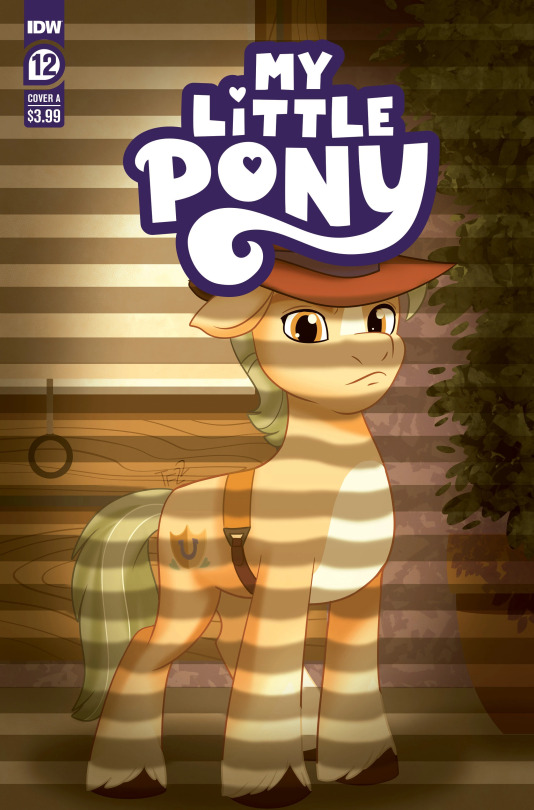
Ah, it's Hitch. I'm not quite sure this counts as film noir. I think it explicitly has to be in black and white. What is this, then, film sepia? If that's not already a thing, please credit me for it. Either way, with the hat and the sepia tones, it puts me more in mind of Indiana Jones than a detective story. I guess Indiana is sort of an archaeology detective. They're not dissimilar stories, is what I'm saying. Other than the hat, the big sign of film noir is the venetian blinds. All in all, kind of a cool cover. And very muted for a pony story!
So if you remember back when we covered issue 11 for Halloween, Hitch wasn't in that issue because he's doing true crime podcasting now. Zipp borrowed some equipment from him, and she's doing the AV for him. They've called their show "MareCRIME Bay", which I'm not sure is stupid or brilliant. Stupilliant, let's call it. Hitch got into this whole thing digging up a cold case from before his time as sheriff, which changed his whole view on Maretime Bay. That's a dark path to go down, Hitch, are you sure you can handle it~?
So starting the podcast got him loads of viewers sending in new information about the case. Well, that's one way to solve cases, I suppose! So here's the case: Pansy Silverbell was a four-time winner of the local bake-off, headed there for her fifth year of competition. But she never made it there, and in fact was never seen again. All we know is she talked to two ponies before failing to reach her destination: Jazz Hooves and Dahlia. What kept her from the competition, and why has she never been seen again? That's honestly a pretty good mystery. Darker than I'd expect, and given some of the stories we've covered, no guarantee the answer isn't just as chilling.
Other facts about Pansy: she ran a baking club and spent most of her time volunteering. She liked soup, and made some killer cupcakes. That was her signature award-winner. She even bragged online about being ready to take the next competition, to the ire of some online commenters. None of the commenters have been identified. But what Hitch is sharing on episode 2 is some interesting photos the Pony Photobug Club caught. Lotta clubs in Maretime Bay, I'm noticing. Guess they needed some way to socialise while still isolating from the other races.
The photographs (available to listeners on their Ponygram account) at least prove Jazz and Dahlia were the ones Pansy spoke to. Jazz runs a hooficure salon in town, and Hitch isn't so manly that he's above making an appointment to talk to her for the case. As soon as he mentions her name, though, Jazz hauls him into the back room to talk. It's a small town, it wouldn't do to hear such things being asked about. Jazz asks if he's asking in an official capacity, since she's not sure how much she wants to say. Bit suspicious, if you ask me, and Hitch thinks so too.
So Jazz's story is just that she was minding her own business walking down the street--minding it a bit too closely, as she runs right into Pansy, knocking her cart over. She helps her pick up the cart, sees her off, that's pretty much it. Not much of a story. Hitch points out she looks a bit grim in the photo for such a simple incident, and she says maybe she was upset by something or somepony else. She continues to be a little bit shifty, such as suggesting she definitely doesn't know who these Ponygram commenters are, even when pronouncing their names perfectly.
Hitch himself didn't put the names together until he heard them aloud. One of the nastier comments left on Pansy's last post was from "DollyYeah". Which, you might notice, sounds like "Dahlia". So that's who Hitch goes to interview next. She runs a tidy little bakery stand, which must be nice to not have a lot of competition anymore. Which is basically what Hitch comes right out and says, accusing Dahlia of being mad enough to leave nasty comments online and then also arrange Pansy's disappearance. I think those two events are a bit apart in scope. I hope they are, anyway…
She and Hitch grab a bite from her own stand, where she reveals she learned to bake from Pansy. So, the reason she left mean comments online is because she was annoyed with Pansy. Or more specifically, the circumstances. The winner of the bake-off was probably going to get a sponsorship deal and 10,000 bits. And Pansy already had a pretty successful bakery as it was, while Dahlia wanted to open her own. Dahlia was one of those friends who gets overshadowed all their life by a more successful one. So she kinda lashed out. Sometimes friends have disagreements, that's all it was.
As is usual for this kind of story, this is the part where Hitch gets stymied for a little bit until an innocuous unrelated comment gives him the hint he needs to break it wide open. In this case (literally), Hitch and Zipp break for lunch and really enjoy their butternut squash chowder. Zipp even comments that she wants to nominate the chowder for an award, and it's that remark which gives Hitch his eureka moment. Pansy never showed at the bake-off--but was she even registered to compete? Or just to attend? He dashes off to pursue the leads.
So Hitch meets with the judges from the bake-off (for a chili lunch), and they confirm they haven't seen Pansy. But another thing they confirm is the very interesting detail that Dahlia was the winner of that contest. She got that 10,000 bits and opened the very bakery where she and Hitch had a snack. For some reason she didn't feel this info was pertinent to share. Before he can digest that (or his latest meal), he receives an interesting email. In short, it's a mysterious podcast listener, somepony who wants to meet him tomorrow afternoon…
Hitch arrives the next day to meet the mysterious email sender, who turns out to be… Pansy Silverbell herself. She's been listening to the podcast, and is quite surprised that she's the subject. She's brought a couple of one of her singature treats. Friendship is like cookies, you see. You need equal icing on both sides, or it won't stick. And that's when the other email recipient drops by: Dahlia. She apologises for running out on Pansy, but she's not concerned about all that. Instead she invites the pair of them to her house--right next door to Dahlia's shop.
Pansy serves them some soup and comes clean about the whole thing. Jazz was the only one from their old friend group who knew, and she pressured Pansy to send that email after the podcast started up. So what's going on is that Pansy never wanted to be "the best", she just happened to be really good at stuff and outshone her friends by accident. Eventually, the prospect of being the champion winner for a fifth time and getting a sponsorship was too much for her. She abandoned everypony and disappeared so she could find herself.
That's it, basically! She wasn't even sure baking was her calling and is into soups now. She just never knew how to start up with "I'm not dead and live next door" to Dahlia, which is fair. The two start over, and Hitch starts up episode 4 of his podcast by declaring he's calling off the investigation. I'd say I dunno how he stretched that all out to four episodes, but I've seen modern comics stretch an entire storyline out to six issues, so actually I believe it. But ye, the comic ends with the important lesson that some things are unsolved because some folks just want a little privacy. Case--and comic book--closed~!
Honestly? Kinda liked this issue. Probably one of the better mysteries they've attempted, and they had a whole miniseries about mystery-solving. I have two main critiques with it. First, I'd say this is a great example of how they do when they focus solely on one or two characters--except it's not really about Hitch, is it? Hitch is just the connecting piece that links all the rest of the story together. And speaking of things connecting it all together... That's my other complaint. This is much more minor, but like... Every lead Hitch followed, other than Jazz, involved a meal of some kind. Like, he didn't need to get chili with the bake-off judges for the story to work, but he did. I thought it was all building to some punchline about detective work making him feel full or something. I dunno, it just felt like a joke set-up that never happened~
0 notes
Text
Astounding Protoconsciousness, Celebrities, 1
Astounding Protoconsciousness, Celebrities, 1
Friday afternoon, 22 September 2023
4 minutes and 50 seconds to read

This series includes descriptions of dream content mapping patterns in a random order by date as an intriguing statistical exploration of genuine causality (not "interpretation") that is virtually identical in every sleep cycle but with extraordinarily unique and engaging narratives. Many of the dream segments in this series come from much longer dreams.
(Two versions of) Gregory Hines (12 April 2017): The first version of Gregory Hines appears as an animated sketch intentionally jumping and falling smoothly and slowly near a skyscraper model with the surface of a disco ball. The continuously shifting colors on parts of its surface are associated with falling Tetris blocks, thus signifying intuitive anticipation of real-world hand mobility and coordination. Modeling of kinesthesia (and the usual associations with height) and hand mobility progresses to leg mobility modeling: The second version of Gregory Hines (emerging from the first) is more realistic, wearing a gray and white vertically pinstriped dance outfit (kinesthetic personification). I sling him over my right shoulder, and he kicks his legs without incident (modeling my absence of real-world leg mobility in the dream state). The first Gregory Hines watches with annoyance. Gregory Hines, a versatile dancer, died of liver cancer on 9 August 2003. (This dream's foundation began with seeing above-ground tree roots. Tree roots also correlate with my lack of real-world leg mobility, so the beginning and end of this dream resolve themselves with similar narratives since childhood.)
Jordan Gavaris (1 June 2015): Canadian dancer (and actor) Jordan Gavaris of "Orphan Black" is performing in "Swan Lake" on a platform so high in the sky that it is impossible to see individual people far below. I explore the area, looking over the edge of the "stage," but I do not seem to be part of the production. He wears a white bodysuit (dance outfit). I have a real-world recollection of Zsuzsanna, who is also here. My perception of being extraordinarily high is well-defined and realistic. Even though I am vaguely wary at one point, there is exhilaration. (The audience could not see the platform unless broadcast on a screen.) The huge distant curtains, which define the virtual barrier between imagination and precursory consciousness, seem part of the sky. There is a typical factor of indoor-outdoor ambiguity and a subplot of a serial killer climbing to the platform, but I remain unafraid. Jordan Gavaris was born on 25 September 1989.
(Two versions of) Kate Capshaw (7 September 2016): An invisible version remains on one bed. The visible actress is under my direction for a new Indiana Jones movie. Both versions stay in bed and thus model my ongoing real-world status. The invisible version emphasizes my lack of real-world consciousness while sleeping. Kate Capshaw was in "Indiana Jones and the Temple of Doom" (1984) and "Dreamscape" (1984). The "Dreamscape" poster looked like one for an Indiana Jones movie. My dream self only recalls her role in the Indiana Jones movie. The beds are in an outdoor public location, partly modeling 3rd Street in La Crosse, Wisconsin. She asks me whether she will die when a lion eats her, but she seems unconcerned. No lions appear. (Lions are otherwise a factor of attaining real-world strength and physicality to leave the dream state, depending on my depth of sleep, which fits in here with the sustained "in bed" scenario. The association here includes hand mobility and abdominal myoclonus regarding a contemplated but unrendered scene where a lion's paw reaches over her bed and onto her abdomen.) Kate Capshaw was born Kathleen Sue Nail on 3 November 1953.
Ken Curtis (2 July 2019): Ken Curtis approaches me as himself (in contrast to his Festus character on "Gunsmoke") as I stand in an unknown outdoor location. We do not interact, and he never speaks. I study my right hand, with my perception zooming in on it. I can see the bones of my fingers with ligaments and muscle tissue but remain unconcerned. I continuously move my fingers, staring at them with fascination. Bandages partly cover my hands and fingers. There is a background influence from previously badly burning my hand in real life (though it has healed). Ken Curtis (Curtis Wain Gates), born on 2 July 1916, died in his sleep of a heart attack in Fresno, California, on 28 April 1991.
David Boreanaz (26 June 2016): When I am with Zsuzsanna watching television, we soon go close to the screen, transporting us to a television studio where they are remaking "The Adventures of Ozzie and Harriet" with David Boreanaz playing Ricky Nelson. He remains near a doorway for a time (signifying my usual recognition of the division between dream-state imagination and the gateway to real-world consciousness). We eventually enter a vivid but undefined liminal space where he says, "There are no cell phones here" (even though we do not have any in the setting), ultimately meaning I have neither my real-world "voice" nor hand mobility while sleeping. David Boreanaz was born on 16 May 1969.
(Two versions of) Tom Welling (20 September 2014): There was a lot of complexity in this dream, as Tom Welling plays the role of a private investigator with Clark Kent (as in "Smallville") associations, but here I will only focus on the part where he dissolves on a bed from inside a Batman costume. Clark Kent, as Batman (in a comic book fantasy where he tells me I am on "Earth C"), is eventually "disintegrating" in a similar manner as the monsters in "Little Monsters" did when exposed to light. One of his "arms" (sleeves) is still flopping around as the empty suit is otherwise without movement on the bed, but Tom is now "invisible." Tom Welling was born on 26 April 1977.
(Two versions of) Art Carney (16 April 2014): The first version of Art Carney is killed in the Loomis Street house (by someone unknown) where Zsuzsanna and I live (in my dream only as Zsuzsanna has never been to America) and hidden under a mattress for a time. The second version of Art Carney appears to be deliberately disguising himself while investigating his murder. I think he may be the same Art Carney murdered earlier. I say to him, seeing through his disguise, "Oh, you're Art Carney." I find my dream's narrative amusing, like the rehearsal of a movie. Art Carney was born on 4 November 1918 and died on 9 November 2003 of natural causes at a rest home.
The influences of my intuition and the deliberate results of my imagination while knowingly navigating the dream state create the same underlying self-evident patterns every sleep cycle, which have remained unchanged for over 50 years. Even so, I feel more mental clarity and personal validity with every series of correlations, with increasing recognition of (and appreciation of) causality as I grow older.
When two "versions" (or levels) of protoconsciousness occur, a virtual division between my absent or "invisible" real-world consciousness while dreaming and the essence of liminality is a factor. Art Carney "murdered" and "under a mattress," Tom Welling "disintegrating" in a bed while leaving a fantastical costume behind, and two versions of Kate Capshaw, both in bed but one version "invisible." These patterns have occurred every sleep cycle for over 50 years.
0 notes
Note
Steddie coffee shop au
Thanks for playing, friend! I'm always a sucker for coffee shop AUs.
The most important thing about this story is that neither Steve nor Eddie work at the coffee shop. Instead, the shop is the main location in the story. It's set in the late 80's just outside of Bloomington, Indiana were Indiana University Bloomington is located. Steve, who reluctantly went to college right after high school, frequents the coffee shop in hopes of avoiding an annoying roommate that makes studying impossible - never mind the fact that Donny's has the best espresso in the world. Eddie, on the other hand, works at the record store to the left of Donny's and tries to avoid the coffee shop like the plague. People come from it with to-go cups they aren't careful with around the records. He's cleaned more sticky coffee of the merchandise than he cares to admit. So - how do they meet?
Steve always says it was like fate that day, bringing him into the coffee shop for a pick-me-up. He didn't know his life was going to change when he stood behind the curly headed stranger but Steve's glad it happened, no matter what. It's not all that often a person meets their other half after a swapped coffee incident. Eddie, he tries to chalk it up to bad timing, but he always gets swatted for it, so his answer is always changing. One a rainy Thursday evening, Eddie never expected to walk into the damn coffee shop, let alone run into a beautiful wall of a human he later learned was called Steve Harrington. His usual cup of coffee was delayed at the store due to a small child breaking the coffee part earlier in the day, so main street coffee it is. Simply standing in Donny's is humiliating for Eddie - the fact that a gorgeous specimen of a man stands behind him is just barely enough to sweeten the terrible moments. Eddie is where he never wanted to step foot. Never mind the fact that when he actually gets his coffee it's the wrong one; while the dark espresso smells amazing, Eddie wants his sugary monstrosity of a drink. If he's going to drop a pretty penny on some coffee, it's going to be diabetes inducing.
When they go to switch coffees, it's almost laughable how dumbstruck they both are. Steve's chest got all tight when Eddie turns around to hunt for his name on someone else's cup. From the second Veronica called out the orders, Steve's known about the mix up. He wonders if Brad behind the counter got the cups all switched around on purpose. Nonetheless, Steve's caught off guard when a furrowed brow and dark brown eyes start zeroing in on people, on him. He tries to get his feet to move, but there's too much happening south of his brain for basic motor skills to compute. It's the grumpy brunette that approaches him, instead. Not to say that Eddie isn't taken by surprise when Steve finally pulls his shit together enough to answer Eddie's question. It's almost too bad that Eddie found his answer so quickly, the boy stumbling over words holding Eddie's coffee towards him is the cutest he's seen in a while and his personality seems to be on par with that diagnosis, too. The immediate anger he felt dissipates, leaving only curiosity and the slightest hitch of want behind. He decides then and there that instead of hightailing it out of the shop like he initially wanted to, Eddie's going to stay - maybe the floppy haired boy might like to do that, too.
Steve stays, there's no surprise about that. They spend a little time talking about menial things like jobs and hobbies, but that quickly gets brushed to the side when Steve notices the bats on Eddie's arms. It's a rush to then compare tattoos and share stories about trips to the parlor and future wants of more ink. Eddie's got a whole list of things he wants and for some reason, Steve hopes he's around to see the newest additions. They probably could have talked the rest of the night but Steve really does have to study and Eddie's more than likely fired for taking such a long break. Before they head out, Steve's nervously asking for Eddie's number. Eddie, the little shit that he is, takes Steve's arm and lengthens it out across the table. His fingers move nimbly to his ear where a pen Steve never noticed before is sitting. Sharp, white teeth tug at the cap until it comes off, then 10 digits are scrawled across Steve's skin. It's embarrassing to admit that Steve spends the rest of the night tracing the numbers and reliving the wink Eddie gave him as he walked out the door.
From there, the coffee shop is their sort of haven. Steve's never acted on the feelings he knows he has for other boys and Eddie's been burnt by so many people before that it's a little easier to simply share a coffee table with a cute guy with no real strings attached. Conversation is easy and never boring. Eddie knows Steve isn't the brightest bulb in the box, but he's funny and has a lot of heart. There's a crew of about six or seven kids that are always mentioned, melting Eddie's tough outer exterior little by little. Steve's seen the way Eddie sometimes looks off into space when the conversation gets slow, he's aware of the hard mask the other puts on, but the squishy inside he gets to see every now and again makes yanking that the armor off more of a game than a chore. For them both, it's nice to fall slowly, to get to know a person on neutral ground before the rest of the world comes into play. Though, there's no fight left in either of them when Steve suggests a time and place that isn't the coffee shop. And while Donny's will always be there place, Steve and Eddie quickly find that empty apartments and low-lit restaurants top sticky tables and the smell of coffee beans. There's so much more to explore now that moving forward is kind of a necessity. Then again, Steve is always going to need his Americano.
Send me a potential AU and I’ll tell you five fun facts that would happen in a story.
#steddie#steve harrington x eddie munson#eddie munson x steve harrington#eddie munson#steve harrington#steve x eddie#eddie x steve#stranger things#bobbie writes#5 AU fun facts prompts
46 notes
·
View notes
Text
Cincinnati’s 1885 Election Involved Every Trick, Up To Hiding Votes In A Whorehouse
Frankly, today’s elections are absolute yawners compared to the voting squabbles of yore. Stolen ballots? Phony registrations? Dead voters? Cincinnati elections featured all of that and more. The 1885 contest, for example, was extreme in every respect.
For nearly 20 years, Cincinnati had been ruled by a corrupt Democratic political machine. The kingpin of this cabal in 1885 was John Roll McLean, publisher of the Cincinnati Enquirer. The machine owned the entire legal and judicial system in Hamilton County, with judges, prosecutors and even jurors on its payroll. The egregious mishandling of capital murder cases, in which obviously guilty criminals walked free, inspired the Courthouse Riot of 1884. Elections were flagrantly bought and sold. Charles Goss, author of the 1912 history, “Cincinnati – The Queen City,” could hardly contain his revulsion:
“Undoubtedly these miserable arrangements would have superinduced dishonesty in the most ethical of decades; but in one of so low a tone as the ‘eighties’ it was certain that the consequences would be appalling. And they were! The stories of ‘miscounting,’ of ‘repeating,’ of ‘stuffing,’ excite a feeling of amazement, while those of buying ballots and of breaking the heads of those who refused to vote the proper ticket awaken a feeling of horror.”
By 1885, Cincinnati reached the limits of tolerance and launched a reform movement aimed at ousting the Democrats by voting in a completely fresh slate of Republican office holders. The Cincinnati Post, at the vanguard of the reform movement, launched [9 October 1885] a bold attack against the machine:
“It is in the interest of good government that the infamous, abominable, disgraceful, coal-oil Legislature, and every similar Legislature, if (may God forbid) Ohio should ever elect another, should be deeply buried beneath the ballots of honest men, and the party rebuked by the election of its opponents. On this ground, and not on the personal fitness of the candidates, The Post earnestly advocates the election of the Republican Senatorial and Legislative ticket in Hamilton County and throughout the State.”
The McLean machine smelled trouble and poured money, booze and muscle into its efforts to salvage its throttlehold on power. The Republicans, backed by some of Cincinnati’s wealthiest men who had lost patience with the arrogance of the Democratic machine, understood they would have to use every means – legal or not – at their disposal to depose McLean and his minions.
The lines were so clearly drawn that few of the newspapers even ran the names of the candidates. Voters in the 1885 election almost exclusively voted straight tickets – either Republican or Democrat. A few radicals “scratched” a candidate or two, but otherwise voted their party’s ballot in total.
Each party shouted claims of shameful electoral malfeasance and most of the accusations were true. In one precinct, Democratic poll watchers arbitrarily added 200 fake votes to their candidate’s tally. In another precinct, there were 131 more votes cast for Republican candidates than there were registered voters. Influential citizens reported having their arms twisted in private meetings with John McLean himself at his Enquirer office. Each party employed “booze and boodle” – free drinks and cash bribes – and imported “voters” from Kentucky and Indiana. Some polling stations reported fisticuffs between members of the Lincoln Club (Republican) and the Duckworth Club (Democrat).
One delicious bit of chicanery involved “Fort Metz,” the notorious bordello run by Louisa Metz on Walnut Street just above Fifteenth. The incident involved the official returns from the Ninth Ward’s Precinct F, an historically Democratic stronghold in the Over-the-Rhine. At the end of election day, Precinct F’s official tally sheet was nowhere to be found. Instead, in the official envelope, monitors discovered a handwritten tally on Duckworth Club stationery of what purported to be the votes for that polling station. It seemed obvious that the Democrats had mandated the outcome in advance, and their on-site flunkies were too stupid to transfer the phony results to the official reporting document.

Someone must have disposed of the authentic tally sheet. Where was it? Burned up? Tossed in the privy? In John McLean’s desk? A young Republican operative named Phillip Alberts appointed himself as an unofficial electoral investigator and went looking. Along the way, according to the Post [19 November 1885] Mr. Alberts acquired several unsavory sources:
“Among them is a woman going by the name Lillie, an inmate of Fort Metz, a disreputable saloon and bawdy house on Walnut-st., almost opposite Turner Hall. Several days ago she told Alberts that another inmate of the house, known as Leslie Herbert, had in her possession some election papers which she was trying to keep hidden.”
Alberts visited Mrs. Metz’s brothel – strictly in the interest of free and fair elections, of course! – and found Leslie Herbert perusing “a curious document.”
“Alberts quietly passed behind the woman, and, looking over her shoulder, was almost dumfounded at discovering that the paper was the missing tally sheet of Precinct F, Ninth Ward.”
Alberts asked for the paper, but Ms. Herbert spirited it away and her fellow “inmates” closed ranks and sent Alberts packing. He returned the next day with a Post reporter, who was informed that Mr. Alberts was sadly mistaken. Ms. Herbert had no election papers in her possession. The document he glimpsed was nothing other than the manuscript copy of a song, and a lyric sheet was produced to support this alibi.
After all the dust settled, the Republican party had demolished the Democratic machine. Joseph Benson Foraker of Cincinnati was elected Governor of Ohio and led a statewide Republican sweep. Among the first gubernatorial actions Foraker blessed was a "ripper" bill removing the authority of the Cincinnati Board of Public Works, an elective body, to dispense patronage jobs and conferring that power on a new Board of Public Affairs, appointed by the Governor. To head the new Board, responsible for some 2,000 patronage positions in the city, Foraker selected George Barnsdale Cox. The Governor’s plum appointment marked the beginning of “Boss” Cox’s long dynasty atop his own political machine.

11 notes
·
View notes
Text
An Indiana man sought on suspicion of throwing a hatchet at people in a park was found Tuesday after an hourslong search through Bloomington's storm sewer system — where investigators recovered a hand scythe, a machete and rifle cartridges.
Eli Swartzentruber, described as a 37-year-old transient, was taken into custody Tuesday evening after he fled from officers to the depths of the underground system, Bloomington police said in a news release.
Groups of officers descended upon the city's streets, flash bang grenades were deployed, special cameras were used to search the sewers, and a shelter-in-place order was issued for parts of Indiana University Bloomington.
Police first posted on social media that they were searching for a barricaded man in the sewer system at around 11:30 a.m. Tuesday. It wasn’t until six hours later that police announced that the man had been safely removed from the storm drain — after he was apprehended by a canine officer — and in custody, at around 5:30 p.m.
Bloomington police shared a breakdown Wednesday of the events that led to Tuesday's manhunt, saying it kicked off with a 911 call at around 9:30 a.m. about a man who was swinging a steel rod at several people.
Hatchet thrown at people; escape into sewers
On their way to the park, officers got a report that the man had gone to a vehicle in a nearby Kroger parking lot, retrieved a hatchet and walked back to the same people in the park and thrown the hatchet at them, police said.
When officers arrived, witnesses said the man had left the area on foot and was seen headed southbound on First Street, police said.
Officers searching for him found clothes that appeared to match those worn by the man hanging from a railing along First Street near a very large storm drain exit.
Officers yelled into the drain, ordering the man to exit. He yelled back, claiming he was armed with a rifle, and threatened to shoot officers if they followed him in, police said.
Investigators identified the suspect as Swartzentruber, who was being sought by two counties, the news release said.
In Daviess County, he had an outstanding arrest warrant on a felony charge of battery against a public safety official, and the Monroe County Sheriff’s Office was searching for him on several felony charges after an incident earlier Tuesday.
Special cameras and noise-flashes deployed
Police called in the department's Critical Incident Response Team for help, a SWAT team from Indiana State Police because of the large area that needed to be searched and Bloomington Utilities employees to provide diagrams of the storm drain system.
The multiagency search effort took hours, with special equipment being used to inspect the sewers and officers removing manhole covers from the streets.
As they were removing one manhole cover, officers found an unfired rifle cartridge below Smith Avenue that appeared to “have just recently been dropped,” police said.
Members of the Critical Incident Response Team deployed noise-flash diversionary devices into the storm sewer, creating loud bangs, apparently to move the man in a certain direction.
A Bloomington utilities camera was also deployed in the storm sewer in the area of North Indiana Avenue and East 6th Street. Once it was 500 feet into the storm sewer, officers saw a man matching the suspect’s description on the camera, believed to be in the area under Kirkwood Avenue, police said.
With that sighting, the man said he would exit the storm sewer, but he instead destroyed the camera and tried to flee further into the system, authorities said.
That's when a trooper's K-9 officer, Loki, was deployed and apprehended the suspect.
Swartzentruber was taken into custody by troopers and found with an empty handgun holster on him.
He was taken to a nearby hospital for treatment, then to the Monroe County Jail, where he was remanded on charges of attempted battery with a deadly weapon and intimidation, police said.
Cartridges, scythe and machete found in sewer
A search of the sewers didn’t find a rifle or a handgun that Swartzentruber claimed to have, but investigators did find several unfired .30-60 rifle cartridges, a hand scythe and a machete.
A search of the sewers will continue to locate any firearms.
The investigation continues, and more criminal charges could be forthcoming, police said.
Indiana University Bloomington campus police ordered occupants of Franklin Hall to shelter in place Tuesday afternoon after it was reported that an armed subject had been located at the storm drain near campus.
University President Pamela Whitten thanked local police agencies and state police for “keeping our community safe today and every day” after the chaos.
“The actions our IU Police Department took today showed their steadfast commitment to prioritizing the safety of our IU community, and we are grateful for their service," she said in a statement.
12 notes
·
View notes
Text
Bio ~

Born: Lane John Jaden May 13, 1993 (29 years old) Vichy, France Gender, Pronouns & Sexuality: Male, He/Him, Straight Hometown: New York City Affiliation: The Syndicate Job position: Professional Thief Education: Middle School, GED Relationship status: Single. Ashanti Garcia (m. 2018-2019), Oriane Cion (m. 2012) Children: 0 Positive traits: Generous, Spontaneous, Team-Player, Protective, Adventurous Negative traits: Impulsive, Violent, Manipulative, Vengeful, Cocky
Early Life and Background Lane Jaden was born in Vichy, France and moved with his father to New York City at 4 years old. He is the youngest of three children born to John Wilson Jaden and Marie Hélène Jaden.
Lane's parents were married for 27 years and met in Vichy, France where they raised their three children up until their divorce in 1997. His father was a water treatment operator and, reportedly, a harsh man who believed in discipline. Lane's older sister, Audrey, was born in 1977 and after their parents' divorce just before Lane's fourth birthday, she has cared for him for several years. Their mother, Marie Hélène remarried to a successful French banker and moved to Paris, France where she had two other children. Estranged from his mother at an early age, Lane had a stronger bond with his older sister and was devastated when she married and left the nest. His older brother, Dimitri was born in 1970 and pursued acting despite his father's disapproval. Lane has never truly known him as Dimitri has never shown any interest to his younger brother and never set foot in New York City or the United States.
Teenage Years and Career
In the late 90s to 00s, John Wilson found himself having to raise Lane on his own. His daughter Audrey had her own family to take care of, and his ex-wife along with his oldest son were leading their own separate lives across the pond. Reaching his 50s and suffering from health problems, he often asked Audrey to take care of him as she continued to act like a substitute mother.
As a teenager, Jaden was frequently in trouble for fighting and petty theft; he was also noted for his "bewildering personality" and bullying of smaller children. At 15, he quit high school to work in a car garage. His father feared that the city was corrupting his son, prompting him to move to Mooresville, Indiana in 2009. However, Lane's wild and rebellious behavior was unchanged, despite his more rural life. In 2011, he was arrested for auto theft, and his relationship with his father deteriorated. Exhausted by his behavior, he decided to ship him off to Paris to live with his mother. Despite having not finished high school, his father convinced him to enroll to Sorbonne University to take semester-based courses to improve his French and obtain a certification. Having only seen his mother at the age of 4, their reunion was awkward and cold. Lane had difficulty fitting in with his half siblings whom he thought received special treatment. He made frequent phone calls to his father begging him to take him back home which he refused as he was hoping Lane could find a more stable home with his half-siblings. But the opposite ensued. Fights broke out between them and one incident involving his stepfather prompted his mother to throw him out of the house. With no money and nowhere to go, Lane ended up couchsurfing and later met his girlfriend Oriane which he later married at only 19. The impulsive marriage was annuled 55 hours later.
Second Marriage, Streetcar Racing and Imprisonement
In 2015, after living for two years in Paris, working as a mechanic, Lane returned to New York City and encouraged his father to leave Indiana to join him. His fascination with cars continued and he became part of the street racing scene while making ends meet as a cashier. In 2016, Lane moved to Miami, one of the most popular racing location and continued his dangerous hobbie that fulfilled his need for constant adrenaline. He met his wife Ashanti in 2018 and they divorced one year later.
At 69 years old, John Jaden announced he was suffering from pancreatic cancer. Devastated by the news, Lane started stealing cars from the streetcar racing community. The drivers, who drove a fleet of luxury sport cars including Ferraris, Lamborghinis and McLarens later found out that Lane was selling parts of their cars for profit. Indeed, attempting to pay for his father's chemotherapy, he decided to plan a robbery with a friend who was an ex-convict. The two robbed a local grocery store, stealing $1K. While leaving the scene, the criminals were spotted by someone who recognized the men and reported them to the police. During the robbery, Lane had also carried a gun which, although it discharged, hit no one. The two men were arrested the next day. Lane demanded to be incarcerated to New York City to be close to his father whose condition worsened. He slowly became part of The Syndicate while behind bars, finally earning money for what he knew what to do best: stealing.
Jaden was convicted of assault with intent to rob, and conspiracy to commit a felony. He was released 2 years later in 2021, his father passed away that year at the age of 71.
6 notes
·
View notes